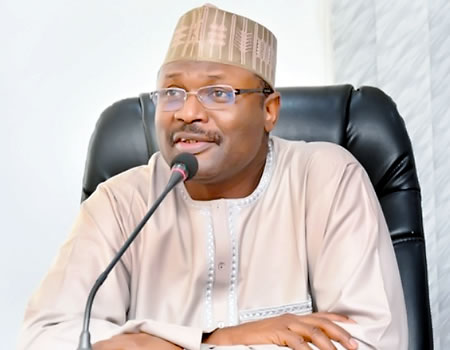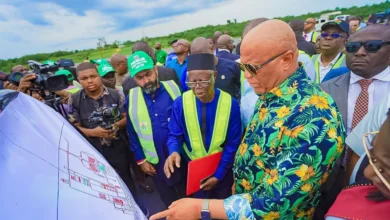
- **With manual collation, electoral umpire plans to rig, Atiku, others allege
- **We’ve not jettisoned electronic transmission of results, says Okoye
- **Group condemns removal of ICT director
National outcry led by the presidential candidate of the Peoples Democratic Party (PDP), Alhaji Atiku Abubakar, is trailing a statement made by a senior official of the Independent National Electoral Commission (INEC) that results of the 2023 elections will be collated manually.
A spokesman of the Atiku Abubakar Campaign Organisation, Barrister Daniel Bwala, alleged that with such a statement coming from a top functionary of the electoral commission, ” INEC is laying the foundation for the rigging of the 2023 elections.”
The alarm was also raised in some other quarters.
National Commissioner and Chairman of INEC’s Information and Voter Education Committee, Festus Okoye had on Saturday said the collation of results of the 2023 general elections would be manual despite the adoption of electronic transmission.
In a swift reaction, Bwala on his Facebook page on Sunday, said the PDP presidential candidate took exception to such declaration by Okoye because it ran foul of the provisions of Section 60 of the Electoral Act 2022.
He said: “Section 60 is clear. At the close of voting at the polling unit, the voting results will be uploaded, meaning that by the time the officer from the unit goes to the ward, he cannot present a result different from the one that was uploaded, which every voter can have access to it.
“And the same thing applies to the local government and the state, because there is evidence you have sent it to a server where it cannot be manipulated.
“By what Okoye said it means they are creating the room and possibility for somebody to manipulate the result without prejudice to the counting and the result as announced at the unit.
Read Also: Reps flay CBN, summon Emefiele over N6.7tr subsidy payments
“And where there is a conflict, that reliance will be placed on the manual collation. In other words, they are trying to go around the provisions of the Electoral Act to take us back to where we are coming from.
“Sadly, they are trying to find a solution where there is no problem because this same electronic upload and transmission has been done in Anambra, Ekiti, in Edo and Osun and they were successful, that procedure has not been challenged.
“If you go to court all the challenge in court were around certificates of individual and whether that individual is qualified or not. But that procedure has worked.
“So why are you trying to fix something that is not broken? It means something is fishy, we smell a coffee. And that’s why we’re calling all well meaning Nigerians and lovers of democracy in Nigeria and beyond to raise their voice and speak with one voice.”
Okoye, had stated that INEC would transmit results from polling units to its result-viewing portal, IReV, as witnessed in recent elections, but that the Electoral Act was clear on how collation should be done.
Okoye said: “there is a marked difference between the transfer/transmission of results and the collation of results. Section 50(2) of the Electoral Act, 2022 gives the commission the absolute discretion to determine the mode and procedure of voting in an election and the transmission of election results.
“Sections 60 and 62 of the Electoral Act govern post-election procedure and collation of election results. Section 60(1) of the Act provides that the presiding officer shall, after counting the votes at a polling unit, enter the votes scored by each candidate in a form to be prescribed by the commission.
“Section 60(5) of the Act makes it mandatory that the presiding officer shall transfer the results, including total number of accredited voters and the results of the ballot in a manner prescribed by the commission. Thereafter, the presiding officer shall after recording and announcing the results deliver the same along with election materials under security and accompanied by the candidates or their polling agents, where available to such person as may be prescribed by the commission.
“The implication of this is that the collation process of results is still essentially manual, but the collation officer must collate subject to his verification and confirmation that the number of accredited voters stated on the collated result are correct and consistent with the number of accredited voters recorded and transmitted directly from polling units.”
Making further clarifications, Okoye said that while the collation of results would “essentially” be done manually, where there was a dispute regarding a collated outcome or that from any polling unit, the collation or returning officer would use the original of the disputed collated result, accreditation data from the BVAS device and the results transmitted directly from the polling unit to determine the correctness of the result.
But Atiku’s spokesperson said there must be strict compliance with the provisions of the Electoral Act with respect to electronic upload and transmission of result, without prejudice to what INEC is thinking about bringing.
“We must never try to change the procedure that has worked in these states mentioned.
“It must be free, it must be transparent.
“We don’t want litigation. We want the voice and the will of the people to prevail in Nigeria,” he said.
Also, another group, AIF Media alleged that INEC’s Director in charge of ICT, Engineer Chidi Nwafor, has been removed.
The group said this is part of grand plan to rig the 2023 polls, while doubting the readiness of the commission to conduct free, fair and credible election next year.
The group entertained fears that INEC may not conduct a free, fair and transparent election in 2023, arguing that the latest redeployment of Nwafor is a sign that all is not well.
It expressed worries that Engr Nwafor was transferred from Abuja headquarters of INEC to Enugu as a mere Administrative Secretary.
The group recalled that it was Engr Nwafor who introduced the Bimordal Voting Accreditation System, BVAS. to replace the card reader. The BVAS has proven to be more liable and has largely eliminated rigging.
The group stressed: “With BVAS, the issue of over voting, double voting and hijacking of ballot boxes have been eliminated. It also transmits results electronically to the INEC central serve.
“More importantly, Engr Chidi Nwafor from information available to AIF MEDIA introduced other applications to help eliminate double registration and ghost resignation.
“The application is capable of sieving voters register and produce real voters. It helped in reducing dubious numbers of voters in some states to real organic voters.”
The group lamented that instead of promoting the brain behind this electoral innovation, he was demoted and transferred to Enugu as Administrative Secretary just six months to the election.
However, Okoye making further clarification on Sunday expressed INEC’s readiness to conduct credible election, stressing that it has not jettisoned electronics transmission of results.
Contending that his interview was misunderstood, the national commissioner said: “some have interpreted the explanation on result management procedure to mean that the Commission has jettisoned the electronic transmission of result and reverted to the manual process. This is not correct.
“For clarity, the procedure for result transmission remains the same as in recent Governorship elections in Ekiti and Osun States. There will be no change in all future elections, including the 2023 General Election.
“We wish to reassure Nigerians that the electronic transmission of result has come to stay. It adds to the credibility and transparency of the process when citizens follow polling unit level results on the INEC Result Viewing (IReV) portal on real-time on Election Day. There will be no change or deviation in subsequent elections.
“The entire gamut of result management is provided for in Sections 60, 62 and 64 of the Electoral Act 2022. In line with the provision of the law, the Commission, in April this year, released a detailed clarification of the procedure for transmission, collation and declaration of result which was shared with all stakeholders and uploaded to our website.”
The commission appealed to all Nigerians to avail themselves of the provisions of the Electoral Act and INEC’s detailed explanation of the procedure and not reach a conclusion on the basis of media headlines.




